Pro-Bolsonaro social media accounts target Brazilian Supreme Court justice
Accounts advocating for the impeachment of Chief Justice Luis Roberto Barroso sought to delegitimize the Brazilian judiciary system
Pro-Bolsonaro social media accounts target Brazilian Supreme Court justice
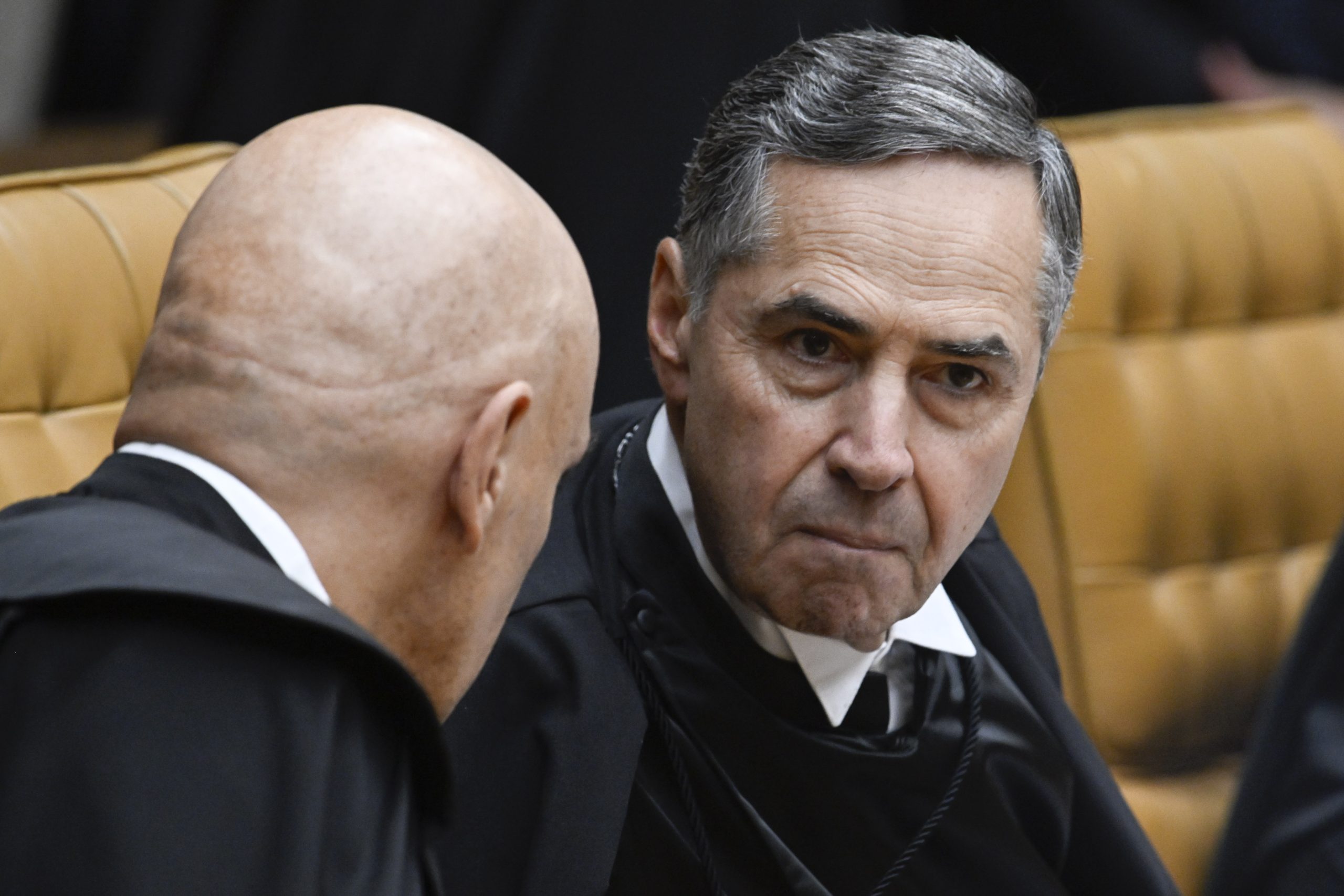
BANNER: Brazilian Supreme Court Chief Justice Luís Roberto Barroso, Brasilia, September 28, 2023. (Source: Mateus Bonomi/AGIF via Reuters Connect)
In July 2023, supporters of former Brazilian President Jair Bolsonaro ran a disinformation campaign targeting Luís Roberto Barroso, who was appointed as Chief Justice of Brazil’s Supreme Court in September 2023. Accounts displaying signs of inauthentic behavior on X – formerly know as Twitter – used a cross-platform strategy to amplify narratives calling for Barroso’s impeachment.
Barroso has been a member of the Brazilian Supreme Court Justice since 2013, appointed by the former president, Dilma Rousseff. He also led the Electoral Court between 2020 and 2022, including organizing the local elections during the COVID-19 pandemic in 2020. In this role, he created programs to combat disinformation online and defended the use of electronic voting machines, while then-president Bolsonaro claimed there had been electoral fraud. Barroso has also participated in significant Supreme Court cases such as in the decriminalization of drugs for personal use and the legalization of abortion in the first three months of pregnancy.
The campaign advocating for Barroso’s impeachment started after he issued a statement against “bolsonarism,” Bolsonaro’s namesake political ideology that unites a variety of far-right positions, such as opposition to LGBTQ+ rights, legalized abortion, and vaccine policies. At a July 2023 conference promoted by the National Union of Students (União Nacional dos Estudantes), Barroso said, “We’ve defeated censorship, we’ve defeated torture, we’ve also defeated ‘bolsonarism’ to preserve democracy and free speech.” The statement tied together two events in Brazilian history: the 1964-1985 military dictatorship and the October 2022 presidential elections in which Bolsonaro lost to Luiz Inácio Lula da Silva, commonly known as “Lula.”
Justice Barroso’s comment generated widespread discussion in traditional media and on social media. His name trended on X on July 13, gathering more than 196,000 mentions, according to a query of the Twitter Trending Archive.
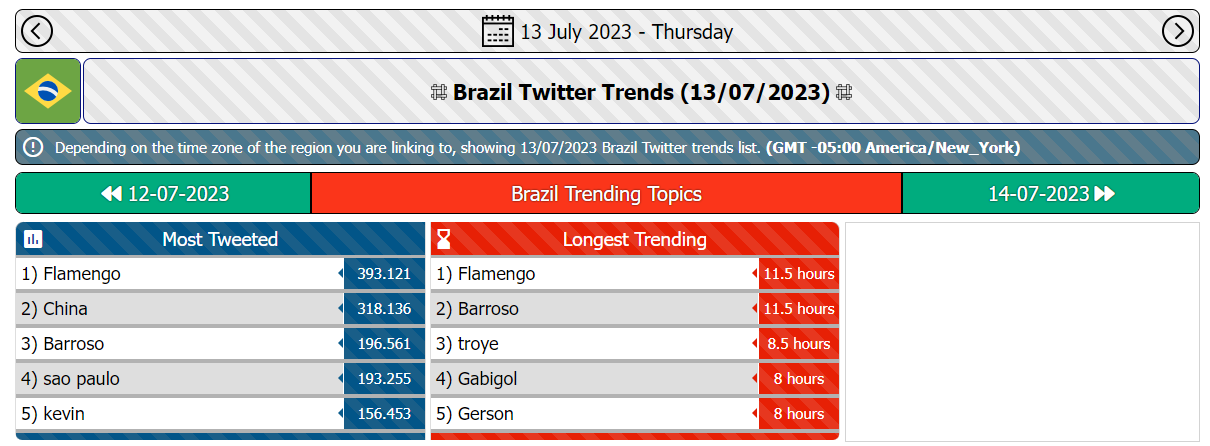
Bolsonaro supporters considered Barroso’s statement a violation of the impartiality and independence of institutional and political powers. As a result, pro-Bolsonaro accounts started an online campaign calling for Barroso’s impeachment. They also extended the attacks to Alexandre de Moraes, a Supreme Court justice who served as president of the Electoral Justice Court during the 2022 Brazilian election.
The DFRLab used the social media monitoring tool Meltwater Explore to search for Portuguese keywords and hashtags on X relating to Barroso between July 10 and July 25, 2023. The selected hashtags were among the most used in the campaign targeting the Supreme Court judges.
The resulting data showed that the campaign accumulated 21,900 mentions between July 10 and July 25, spiking on July 13 with 4,910 mentions.
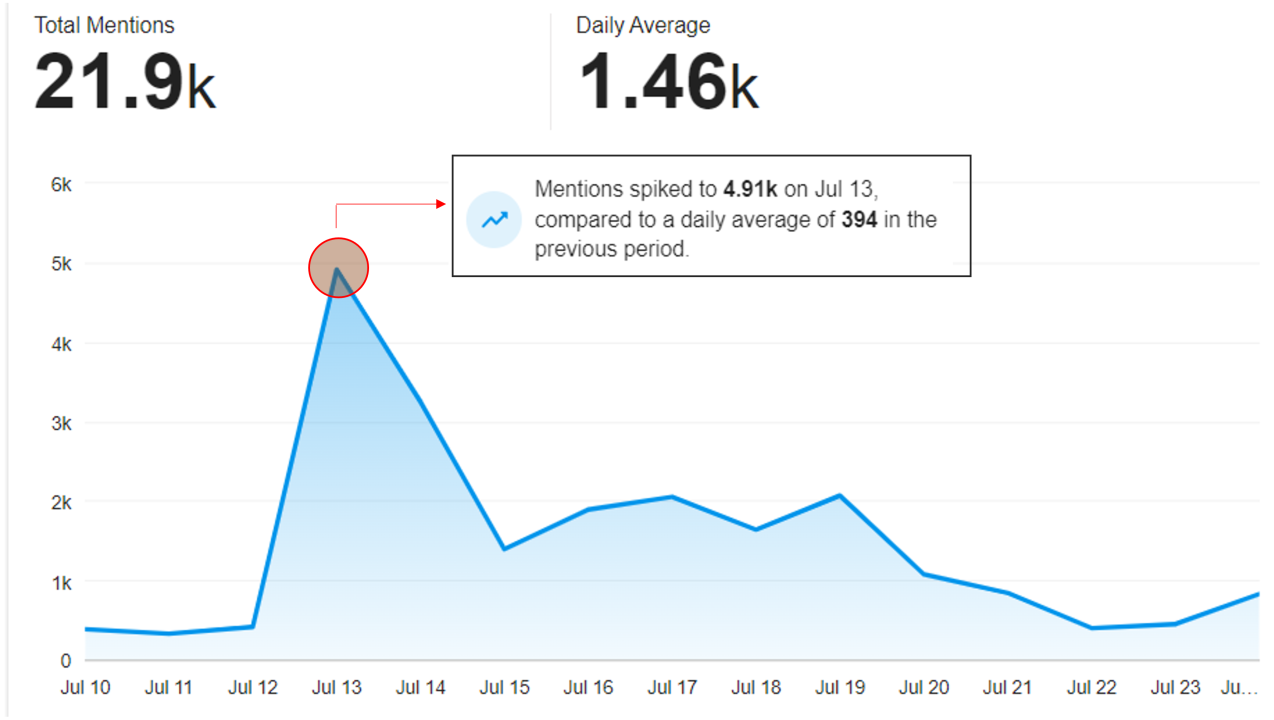
A recent history of targeting Supreme Court justices
Justices of the Brazilian Supreme Court have been targeted by intimidation and harassment campaigns from Bolsonaro’s allies since his 2019 presidential inauguration. A query using Meltwater Explore found 134,000 mentions of hashtags in combination with terms of harassment targeting the court and its members between January 1 and July 31, 2023. One campaign began in early 2023, gathering 2,580 mentions on January 27, less than three weeks after Bolsonaro supporters stormed the country’s Congress, Supreme Court, and presidential palace. Another campaign with 4,495 mentions peaked on May 5, around the same time the Supreme Court canceled a controversial executive pardon that Bolsonaro had given to Daniel Silveira, a member of Congress.
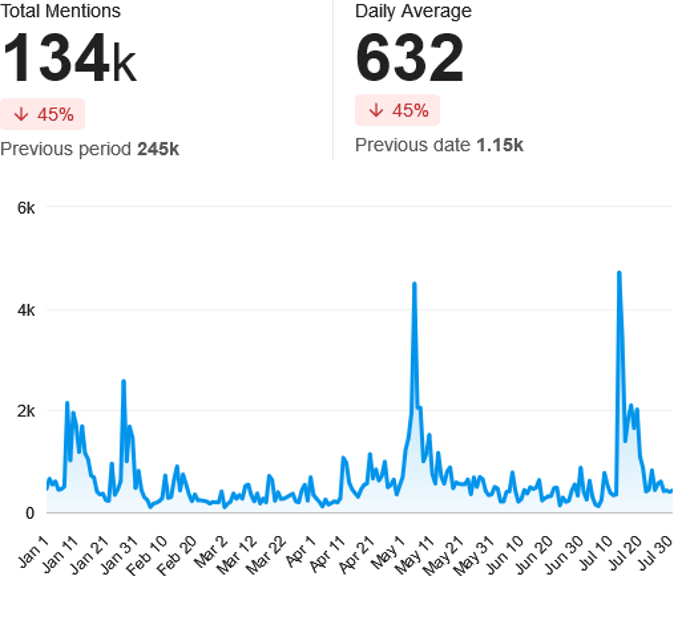
On at least two occasions during the Bolsonaro administration, attacks extended beyond the virtual space and manifested in the physical world. In November 2022, Bolsonaro supporters followed and intimidated Barroso and other Supreme Court judges during a trip to New York. In July 2023, Brazilian tourists at an airport in Rome verbally harassed Supreme Court Justice Moraes and his family, reportedly slapping his adult son.
July 2023 narratives
The July 2023 online campaign against Justice Barroso promoted two narratives. One labeled the court as an institution established by criminals and dictatorial judges, an attempt to delegitimate the Brazilian justice system; the other invited X users to push their representatives in Congress to support Barroso’s impeachment.
Analyzing X data originating from July 12-14, 2023, the DFRLab conducted social network analysis to determine which accounts retweeted each other. We observed that the primary accounts amplifying the narratives against the Supreme Court Justice displayed multiple indicators of potential inauthentic behavior. One account, @irineuteixera45, averaged more than two hundred tweets daily during this period, while another, @curimim, posted around 195 tweets per day.
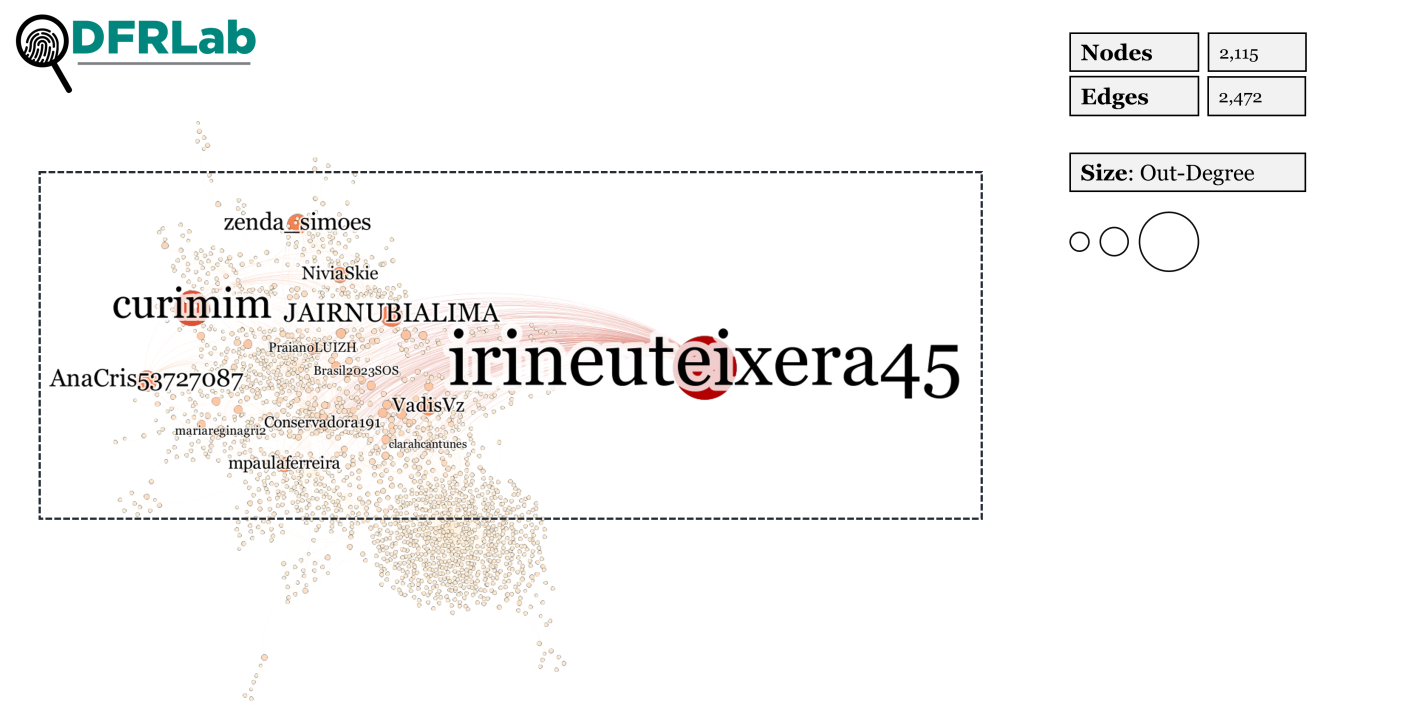
The account @irineuteixera45 also posted hashtags related to the campaign, such as #ForaBarroso (“Barroso out!”), alongside unsubstantiated claims that the Supreme Court justice interfered in the Brazilian election.

Another account displaying signs of inauthentic behavior was @JoaquinAlende, which at the time of publishing had more than 600 followers. The account routinely publishes messages criticizing Lula and his government. On July 13, however, the account tweeted the hashtag #ImpeachmentBarroso and accused the Supreme Court and the Lula’s Partido dos Trabalhadores (Brazilian Worker’s Party) of being criminal organizations, comparing them to the Brazilian gangs Primeiro Comando da Capital (First Capital Command) and Comando Vermelho (Red Command).

The profile picture for @JoaquinAlende appeared to have been taken from an online stock photography website and altered, possibly to avoid detection, a common indicator of inauthentic behavior. This was one of two accounts in the network – the other being @NiviaSkie, which has since been suspended – to have reappropriated a stock photo from elsewhere online.

Keeping the impeachment campaign alive
The DFRLab also found evidence of an attempt to keep the hashtags on X’s trending list over a period of weeks. The account @Conservadora191, which was among the most significant amplifiers during the July 13 spike, continued posting and reposting the hashtag #ForaBarroso at least thirty-two times through July 25. The profile, which has more than 59,000 followers, also encouraged other accounts to use the hashtag, publishing posts in Portuguese that said, “Have you already posted #ForaBarroso today?” (July 13), “Have you given up on #ForaBarroso? I haven’t” (July 16), and “Don’t forget Barroso’s statement” (July 17).
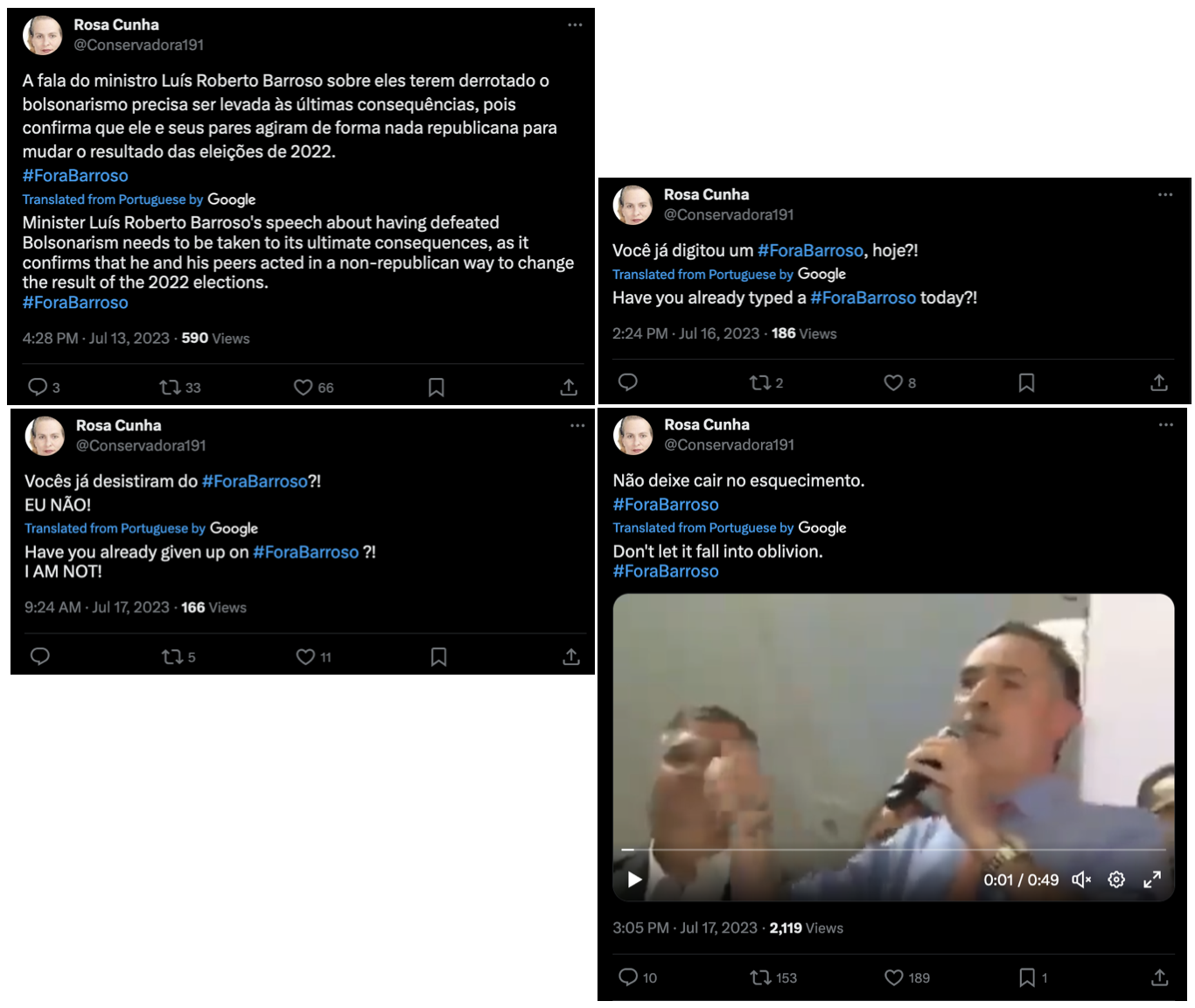
On July 19, satiric pro-Bolsonaro account @VanLiberdade, which has 215,000 followers, posted an image showing a list of ninety Brazilian parliamentarians and claimed they supported Barroso’s impeachment. While a group of eighty-one parliamentarians is reported to have filed a formal impeachment request, the tweet also portrayed the situation as Congress being more broadly against Barroso. According to these reports, eleven senators and seventy deputies signed the letter, which if accurate would still not make up a majority of either chamber. The Brazilian senate has eighty-one sitting senators, while the deputies chamber comprises 153 deputies.
Despite mischaracterizing the extent of the demand for impeachment, the tweet garnered more than five hundred reposts and around 1,800 likes.
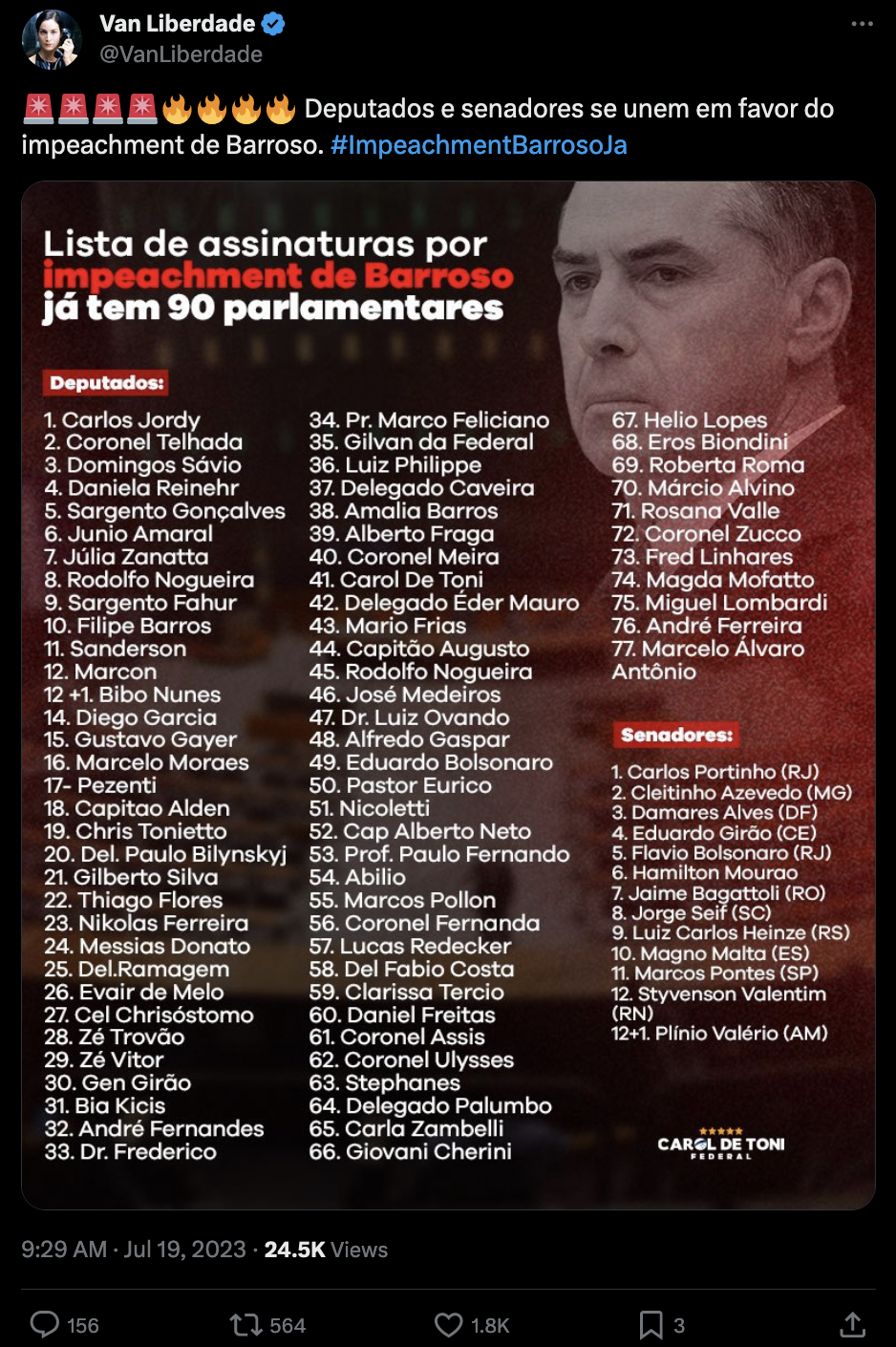
The account @VanLiberdade also manages a Telegram channel with more than 61,000 subscribers. On July 19, the channel owner reposted the same message, encouraging members to participate while explicitly asking for retweets. More than 21,000 members of the channel saw the message; while there is no way to determine how much engagement the Telegram post drove to the platform, this illustrates the account engaging in a cross-platform strategy.

In another example of accounts targeting the Supreme Court justice, the account @BoucinhasCassio posted a series of tweets on July 24 sharing four hashtags that targeted Barroso: #impeachmentluisrobertobarroso (“Luis Roberto Barroso impeachment”); #luisrobertobarrosomaucaráter (“bad nature Luis Roberto Barroso”); #luisrobertobarrosocorrupto (“Luis Roberto Barroso is corrupt”); and #luisrobertobarrosodesonesto (“Luis Roberto Barroso is dishonest”). The account frequently used the quote reply option to share these hashtags. It also published tweets in rapid succession; for example, three tweets appeared at 11:56 p.m. local time, followed by three more at 11:57 p.m., and an additional four at 11:58 p.m. Most tweets had not received any engagement or even views, however, with the highest view count a meager eight views at the time of writing.
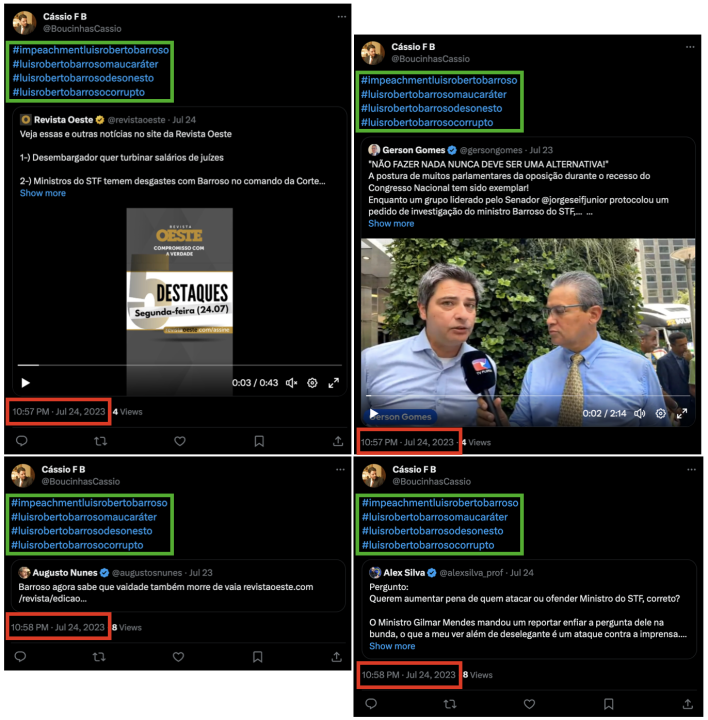
Overall, there has been a notable increase in narratives targeting Brazil’s democratic institutions, especially from pro-Bolsonaro supporters, ever since the former president left office. This has been accompanied by increased online harassment, contributing to heightened online polarization. The DFRLab will continue monitoring Brazilian social media for similar campaigns in the coming months as multiple Bolsonaro supporters are tried for their alleged involvement in the January 8 Congress attack. The Supreme trial began trying suspects in September 2023; to date, twenty-five people have been charged, facing fourteen to seventeen years in prison for criminal association and crimes related to an attempted coup d’état.
Cite this case study:
Beatriz Farrugia and Esteban Ponce de León, “Pro-Bolsonaro social media accounts target Brazilian Supreme Court Justice,” Digital Forensic Research Lab (DFRLab), January 11, 2024, https://dfrlab.org/2024/01/11/pro-bolsonaro-social-media-accounts-target-brazilian-supreme-court-justice.

